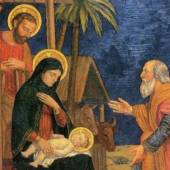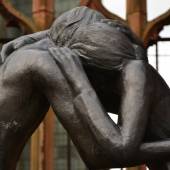But who do you say that I am

August 27, Sunday of the 20th week in Ordinary Time
Daily Readings: First reading: Isaiah 22:19–23; Romans 11:33–36; Matthew 16:13–20
God's experience and Christ's experience lead a person to the knowledge of God and Jesus Christ respectively. Christ-experience leads some people to know God as in the case of St. Paul. It was a unique experience for him. Being with God or Christ does not necessarily guarantee this knowledge. It is only a medium.
One has to really make an attempt to know God and Christ. For St. Peter, the grace to identify Jesus Christ was given by God in spite of the impulsive character that Peter was. All of these presuppose a fact. That is the longing of humanity for the Messiah or the Christ. Jewish race was one of those rarest groups of people who longed for the coming of a Messiah for ages.
On his arrival, unfortunately, not all of them recognized him as he was/is. And much worse, they ill-treated, constantly opposed, persecuted, and killed him on the Cross. That is why the Jewish nation lives on the hope of the arrival of the Messiah still today. Only they will be able to say what type of Messiah that they are waiting for.
The First Reading taken from the Book of First Isaiah (Proto-Isa) deals with a prophecy. The prophet foretells that God will expel and depose Shebna from the job of the master of the palace and replace him with Eliakim, son of Hilkiah. God chooses one over the other all throughout the History of Salvation for a certain purpose. In the case of Eliakim, God promises to clothe him with the vestment and belt of Shebna. It is clothing with honor fitting to the authority that will be granted to him. Eliakim will be like a father to the inhabitants of Jerusalem and to the house of Judah.
God will place the keys of the house of David upon his shoulder. He will sit upon the throne of glory in the house of his father. Certainly, the description of Eliakim sounds heavily Christological and thus it enables us to see the connection with the Gospel reading and realize that the character of Eliakim is a prototype of Jesus Christ, the Messiah.
The Responsorial Psalm is an individual psalm of thanksgiving. The core expression of this Psalm of gratitude is praise and worship of God. The psalmist sings the praises of the benevolent God. A sense of obligation to the benefactor is implied. The author or the individual who sings God’s praises is not a particular person or character but is a collectivistic individual. The first part of the response to the Psalm is an affirmation “Lord, your love is eternal” while the second part is an earnest appeal, “Do not forsake the work of your hands”. The appeal is a faith expression based on the affirmation that God loves and His love is eternal.
The Second Reading from St. Paul’s Letter to the Romans continues the spirit of praise and prayer of the Psalmist. Paul praises God’s ways which are incomprehensible. No human mind can ever enter into the depths of God’s wisdom and knowledge. No one knows the mind of God and no one has ever been His counsellor. Everything came to existence from Him, through Him, and in Him. Paul concludes his prayer, by identifying and offering God glory for all eternity. Thus Paul reiterates that God is the creator, sustainer, and the final goal of the universe.
The Gospel Reading according to St. Matthew locates Jesus in the region of Caesarea Philippi. It is a city Herod Philip built in honor of Caesar Augustus. He also built a grotto to project the greatness of Augustus. The emperors considered themselves gods and sons of god and thus promoted the worship of human gods. St. Mark identifies this city as a place infected with pagan worship while Matthew highlights the custom of worship of human-made gods.
It is in this strategically important place that Jesus raises a question to his disciples on his identity. The question in Mark’s version is “Who do people say that I am?” (8:27) and “Who do you that I am?” (8:29) while in Mathew it is: Who do people say that the Son of Man is?” (Matt 16:13) and “But who do you say that I am?” (Matt 16:15).
The expressions “I am” and “the Son of Man” (a being) seems to point out to the same person and perhaps to the revelation of God “I am” to Moses during his experience at the ‘burning bush’.
Jesus was in the pagan region of Tyre and Sidon in the reading of the last Sunday healing the daughter of the Canaanite woman. And in today’s Gospel Reading Peter declares him to be the Christ, the Son of the living God in the pagan region. Jesus steps into the non-Jewish world and is found busy.
In the first place, we are to reach out to those who share our borders. Secondly, unless and until the grace of God is given to us, none of us can become worthy of identifying and declaring Jesus as the Son of the living God. Eliakim receives God’s favor by God’s own choice. Peter is able to identify Jesus as the Messiah because Jesus’ Father has chosen to reveal Himself to Peter. May we pray that we too find favour in God’s eyes.
Radio Veritas Asia (RVA), a media platform of the Catholic Church, aims to share Christ. RVA started in 1969 as a continental Catholic radio station to serve Asian countries in their respective local language, thus earning the tag “the Voice of Asian Christianity.” Responding to the emerging context, RVA embraced media platforms to connect with the global Asian audience via its 21 language websites and various social media platforms.












